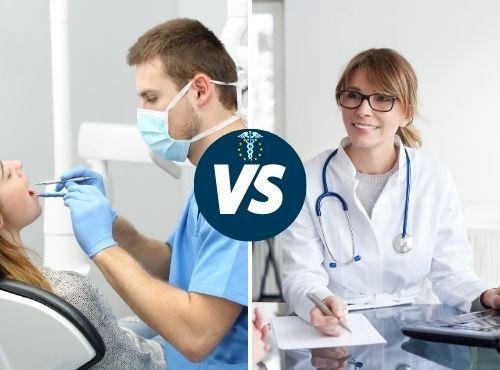Intro
Medicine, dentistry, and pharmacy are all highly respected healthcare professions. Despite the fact that these careers are in the healthcare industry, they are very different in terms of rewards, obligations, and responsibilities. Patients seek assistance from doctors, pharmacists, and dentists in hospitals and health clinics; However, the type of interaction and services these professionals provide vary greatly.
These healthcare professionals work on different levels, but they all try eventually to reach one goal: to keep people healthy. They also have different specialties and disciplines. For example, some dentists can specialize in orthodontics (braces and crowns). Others may specialize in treating jawbones problems. Pharmacists, on the other hand, usually work in pharmacies, but they also can work in hospitals, where they fill orders for chemotherapy treatments and medicines. Some pharmacists can own their own pharmacies or work for a chain of pharmacies.
Should You Be a Doctor?
Becoming a doctor is a childhood dream for many people. Doctors save lives and enjoy high status in society, but becoming a doctor requires a lot of hard training to ensure that you are capable of handling the immense responsibility that comes with the profession.
Because of its top-tier medical universities, Bulgaria is one of the best destinations in the world where your ambition may come true. Candidates can get a General Physician degree after completing the six-year program, and then specialize in a variety of disciplines.
Choosing a medical specialty is one of the most sensitive decisions you will make after graduating from medical school. This decision is influenced by a number of things, including your clinical interests, experience, and financial abilities. Clinical experience is critical as they allow students to witness what a specialty carries responsibilities on a day-to-day basis. You will choose between surgical and non-surgical specializations. Once you’ve made your choice, the possibilities become limited, and you can arrive at a final decision. Keep an open mind and consider all factors before making a final decision.
Should You Be a Dentist?
To be a dentist, you need to enroll in a five-year (10-semester) curriculum that contains basic dental courses and clinical sciences. The curriculum will try to provide you with scientific and professional growth without knowledge gaps. Basic medical sciences and dental courses are given to students in the first three years to build a complete idea about clinical dentistry.
The remaining two years are dedicated to an intense clinical study of many dental specialties, with a great focus on patient assessment and care. Students usually participate in optional programs, conferences, and hospital-based practices during their final year.
Students are granted the title of “Doctor of Dentistry” after successfully completing the program. The focus of dentists who work in a general practice commonly goes to preventative treatments that include teeth decay prevention and teeth cleaning or oral hygiene, but they also can repair cavities, fractured teeth, and extract unhealthy teeth if necessary. They also can administer a topical anesthetic agent before drilling the teeth to reduce discomfort. These dentists can prescribe antibiotics to battle teeth infections too. Here are some other responsibilities:
- Use drills, mouth mirrors, and other medical tools to treat patients.
- Read X-ray images and analyze pictures to help identify problems.
- Make a realistic model for the patient’s mouth and teeth to develop accurate and fitting dentures.
- Provide dental hygiene tips to patients and supervise the work of dental hygienists.
- Diagnose dental problems and perform a physical examination.
Should You Be a Pharmacist?
To be a pharmacist, you need to enroll in a program that usually lasts for five years (10 semesters). It starts with an overview of the fundamental sciences in pharmacology to build a foundation for future pharmacological research.
Students participate in general and special pharmaceutical education in laboratories, teaching pharmacies, institutes and departments, and pharmaceutical companies. This usually happens in the second half of the program.
The title of “Doctor of Pharmacy” is awarded to students upon successful completion of the program. Prescriptions for all types of drugs are filled by pharmacists. They are able to prepare and calculate the correct doses of medications prescribed by doctors. Pharmacists are also responsible for keeping records to keep track of drugs and avoid harmful pharmaceutical interactions. They also conduct inventory audits to ensure that all pharmaceuticals are not expired. Here are some other responsibilities:
- Inform patients about when and how to take drugs.
- Educate patients about the potential adverse effects of drugs.
- Inform patients about the equipment they should buy, such as blood pressure monitors and diabetic test strips.
- Vaccinate people against the flu and other common illnesses.
- Educate other health professionals on how to use or take medication.
So, Which One Is Better?
It is entirely up to you to decide whether you want to be a pharmacist or a doctor. The issue depends on your interests, talents, and expertise. Some students may believe that being a pharmacist is a better career option than becoming a doctor and vice versa. Usually, the first 4-5 years of becoming a pharmacist are more difficult than those of becoming a dentist, for example.
For most dentists, the last two years are far more difficult than those of pharmacists. This is due to the extensive training required before seeing patients, which takes two years to perfect. As a result, both specialties are quite difficult, but whether you choose pharmacy or dentistry as a professional path, both provide a wide range of opportunities in the future. You can, for example, work at dental hospitals, and institutes, or even open your own dental clinic after completing your dentistry study.
However, don’t choose dentistry as a professional path only because it pays well. Don’t forget that as a pharmacist, you can work in a hospital or any other healthcare institution after completing your pharmacy school, or you can even own your own pharmacy if you have the necessary capital.
Which One Pays Well?
Pharmacists earn an annual salary of $128,090. Dentists earn over $159,200 on average. Doctors earn an annual salary of $213,270, according to the US Bureau of Labor Statistics. When it comes to employment growth, demand for pharmacists has dwindled over time. From 2018 to 2028, the job growth rate for pharmacists is predicted to be 0%. On the other hand, between 2018 and 2028, job growth for doctors is predicted to be 10%. Dentistry will see a 7% increase in jobs during the same period.

